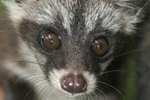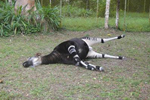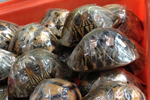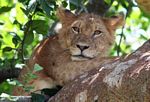Few people have ever heard of the Javan ferret-badger, but that hasn’t stopped this animal—little-known even to scientists—from being sold in open markets in Jakarta according to a new paper in Small Carnivore Conservation. The Javan ferret-badger (Melogale orientalis) is one of five species in the ferret-badger family, which are smaller than proper badgers with long bushy tails and elongated faces; all five species are found in Asia.
“Very little is known about this species—one of the least known small carnivores in Asia. It is endemic endemic to the island of Java where it occurs in tall forests, although it may be somewhat adaptable to human-altered habitats as well,” the paper’s author, Chris Shepherd the deputy regional director with anti-wildlife crime NGO TRAFFIC, told mongabay.com.
While walking Jakarta’s Jati Negara market in June of last year, Shepherd documented five Javan ferret-badgers for sale. That the species was being sold was notable, since it is rarely documented even in the wild.
“Like many animals in Indonesia, the Javan ferret-badger is traded as a novelty pet,” Shepherd says. Yet next-to-nothing is known about the animal’s dietary requirements or natural history, making any captive situation problematic.
Shepherd says that while the Javan ferret-badger isn’t a strictly protected species in Indonesia, it is illegal to take them from the wild.
“Currently, the Javan Ferret Badger is provided with some protection, as there is no quota for its capture from the wild, and therefore none should be ending up in the markets,” he says. “Further legal protection, with higher deterrents, should be provided. But not just on paper. Far too often, species in Indonesia are provided with legal protection, but trade continues openly in the markets. One only has to pay a visit to any of the large markets in Jakarta to see illegal wildlife trade—slow loris, leopard cats, eagles, and more—all openly offered for sale.”
The species is so cryptic, that the IUCN Red List has categorized it as Data Deficient, noting “almost no available contemporary information on status, threats or distribution.”
Shepherd concludes that since this species is “known only from a few specimens” it is “badly in need of more research, and immediate protection.”

A Javan ferret-badger for sale in a market in Jati Negara market in Jakarta. Photo by: Turtle Conservancy/Maximilian Maurer.
CITATION: Chris R. Shepherd. Observations of small carnivores in Jakarta wildlife markets, Indonesia, with notes on trade in Javan Ferret Badger Melogale orientalis and on the increasing demand for Common Palm Civet Paradoxurus hermaphroditus for civet coffee production. Small Carnivore Conservation, Vol. 47: 38–41, December 2012.
Related articles
(04/23/2013) Authorities in Vietnam arrested a man who they say was transporting 53 king cobras — a protected snake species — in his car, reports the Associated Press.
Rhino horn madness: over two rhinos killed a day in South Africa
(04/22/2013) Rhino poachers have killed 232 rhinos during 2013 so far in South Africa, reports Annamiticus, which averages out to 2.1 a day. The country has become a flashpoint for rhino poaching as it holds more rhinos than any other country on Earth. Rhinos are being slaughter for their horns, which are believed to be a curative in Chinese traditional medicine, although there is no evidence this is so.
Lions for sale: big game hunting combines with lion bone trade to threaten endangered cats
(04/18/2013) Koos Hermanus would rather not give names to the lions he breeds. So here, behind a 2.4-meter high electric fence, is 1R, a three-and-a-half-year-old male, who consumes 5kg of meat a day and weighs almost 200kg. It will only leave its enclosure once it has been “booked”‘ by a hunter, most of whom are from the United States. At that point the big cat will be set loose in the wild for the first time in its life, 96 hours before the hunt begins. It usually takes about four days to track down the prey, with the trophy hunter following its trail on foot, accompanied by big-game professionals including Hermanus. He currently has 14 lions at his property near Groot Marico, about two and a half hours by road west of Johannesburg.
Civet poop coffee may be threatening wild species

(04/16/2013) Popularization of the world’s strangest coffee may be imperiling a a suite of small mammals in Indonesia, according to a new study in Small Carnivore Conservation. The coffee, known as kopi luwak (kopi for coffee and luwak for the civet), is made from whole coffee beans that have passed through the guts of the animal and out the other side. The coffee is apparently noted for its distinct taste, though some have argued it is little more than novelty.
(04/15/2013) What do you do when you’re smuggling 22,000 pounds of an endangered species on your boat? Answer: crash into a protected coral reef in the Philippines. Last Monday a Chinese vessel slammed into a coral reef in the Tubbataha National Marine Park; on Saturday the Filipino coastguard discovered 400 boxes of pangolin meat while inspecting the ship. Pangolins, which are scaly insect-eating mammals, have been decimated by the illegal wildlife trade as their scales are prized in Chinese Traditional Medicine and their meat is considered a delicacy.
Infamous elephant poacher turns cannibal in the Congo

(04/03/2013) Early on a Sunday morning last summer, the villagers of Epulu awoke to the sounds of shots and screaming. In the eastern reaches of the Democratic Republic of the Congo, that can often mean another round of violence and ethnic murder is under way. In this case, however, something even more horrific was afoot.
Poachers enlisting impoverished wildlife rangers as accomplices in elephant, rhino killing
(04/01/2013) Corruption among wildlife rangers is becoming a serious impediment in the fight against poaching, fuelled by soaring levels of cash offered by criminal poacher syndicates, senior conservation chiefs have admitted. Rangers in countries as diverse as Tanzania and Cambodia are being bribed by increasingly organised poaching gangs keen to supply ivory, rhino horn and tiger parts to meet huge consumer demand in Asia.
A thousand soldiers sent after marauding elephant poachers [warning: graphic photos]

(03/26/2013) Eight Central African nations have announced they will send a thousand soldiers after poachers responsible for slaughtering 89 elephants, including over 30 pregnant mothers, in Chad earlier this month. The mobilization of soldiers and law enforcement officers could be a sign that Central African countries are beginning to take elephant poaching, which has decimated populations across Africa, more seriously.
Over ten percent of a species’ total population found in smuggler’s bag

(03/25/2013) On Friday, March 15th Thai authorities arrested a 38-year-old man attempting to collect a bag containing 54 ploughshare tortoises (Astrochelys yniphora) and 21 radiated tortoises (Astrochelys radiata) in Suvarnabhumi International Airport. Found only in Madagascar both species are listed as Critically Endangered and protected under the Convention on International Trade in Endangered Species (CITES), but have become lucrative targets for the black-market pet trade given their scarcity and beauty.
